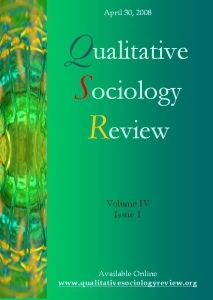Grounded Theory and Serendipity. Natural history of a Research
DOI:
https://doi.org/10.18778/1733-8077.4.1.09Keywords:
Grounded theory, Serendipity, Qualitative sociology, Field research, Natural history of research, Sociology of interaction, Social world, Human-animals – non-human animals interactions, Anthropomorphization of animalsAbstract
The paper deals with the issue of “serendipity” (which constitutes the context of discovery) in field research and the analysis of data by using the grounded theory methodology. The thesis of the paper is: the methodology of grounded theory is naturally associated with serendipity. We describe two aspects of serendipity in grounded theory: 1. substantive, and 2. theoretical. We present in the paper serendipity phenomenon by using the case of research on the “social world of pet owners”. We show how the research is developed by a sequence of decisions being made by researchers. The process of emergence of the main analytical category, subcategories and the whole theoretical construction during the long time of the field research and theoretical group analysis is presented, as well as the procedure of coming to unanticipated theoretical conclusions. It was all possible because of the interactional character of serendipity happening during the research in grounded theory style of investigation.
Downloads
References
Charmaz, Kathy (2006) Constructing Grounded Theory: A Practical Guide Through Qualitative Analysis. London: Sage.
Google Scholar
Clarke, Adele (2003) “Situational Analysis: Grounded Theory Mapping After the Postmodern Turn.” Symbolic Interaction 2(4): 553 – 576.
Google Scholar
DOI: https://doi.org/10.1525/si.2003.26.4.553
Clarke, Adele (1991) “Social Worlds/Arenas Theory as Organizational Theory.” Pp. 119 – 158 in Social Organization and social Process. Essays in Honor of Anselm Strauss, edited by D. Maines. Aldine de Gruyter, New York.
Google Scholar
Dlugosz – Kurczabowa, Krystyna (2003) The New Polish Etymological Dictionary. Warsaw: PWN (in Polish)
Google Scholar
Fine, Gary Allan and James Deegan (1996) “Three Principles Of Serendipity: Insight, Chance, And Discovery In Qualitative Research.” Qualitative Studies in Education 9(4): 434 – 447.
Google Scholar
DOI: https://doi.org/10.1080/0951839960090405
Glaser, Barney (1978) Theoretical Sensitivity. San Francisco: The Sociology Press.
Google Scholar
Glaser, Barney and Judith Holton (2004) Remodeling Grounded Theory [80 paragraphs]. Forum Qualitative Sozialforschung / Forum: Qualitative Social Research 5(2). Retrieved January 2005 http://www.qualitativeresearch.net/fqstexte/2-04/2-04glaser-e.htm
Google Scholar
Glaser, Barney and Anselm L. Strauss (1967) Discovery of Grounded Theory : Strategies for Qualitative Research. Chicago: Aldine.
Google Scholar
DOI: https://doi.org/10.1097/00006199-196807000-00014
Hannan, Patrick J. (2006) Serendipity, Luck and Wisdom in Research. Lincoln: iUniverse.
Google Scholar
Kacperczyk, Anna (2005) “Application of the concept of social worlds in empirical research.” Pp. 167 – 189 in The Construction of Self and Society. European Variants of Symbolic Interactionism, edited by K. Konecki and E. Halas. Warszawa: Scholar (in Polish).
Google Scholar
Konecki, Krzysztof (2004) A private presentation of interactional contexts. Analysis of photographs of pets. A paper presented at the XII Sociological Convention in Poznań, 15 –18 September, 2004 available at http://www.krzysztofkonecki.prv.pl/ in Polish.
Google Scholar
Konecki, Krzysztof (2000) A study of the qualitative research methodology. Grounded theory. Warsaw: PWN (in Polish).
Google Scholar
Lorenz, Konrad (2002 [1949]) Man meets Dog (So kam der Mensch auf dem Hund), London-New York: Routledge.
Google Scholar
DOI: https://doi.org/10.4324/9780203166086
Lowe, Brian M. (2002) “Hearts and Minds and Morality: Analyzing Moral Vocabularies in Qualitative Research.” Qualitative Sociology 25(1): 105 – 123.
Google Scholar
DOI: https://doi.org/10.1023/A:1014312425831
McCallin, Antoinette (2004) “Pluralistic dialoguing: A theory of interdisciplinary teamworking.” The Grounded Theory Review 4(1): 25 – 42.
Google Scholar
Merton, Robert (1968) Social Theory and Social Structure. New York, London: The Free Press, Collier – Macmillan Ltd.
Google Scholar
Merton, Robert (1968a) “The Mathew Effect in Science.” Science 159(3810): 56 – 63.
Google Scholar
DOI: https://doi.org/10.1126/science.159.3810.56
Merton, Robert K. and Elinor Barber (2004) The Travels and Adventures of Serendipity. Princenton: Princeton University Press.
Google Scholar
Nathaniel, Alvita K. (2004) “A Grounded Theory of Moral Reckoning in Nursing.” The Grounded Theory Review 4(1): 43 – 58.
Google Scholar
Reichenbach, Hans (1938) Experience and Prediction: An Analysis of the Foundations and the Structure of Knowledge. Chicago: University of Chicago Press.
Google Scholar
Roberts, Royston M. (1989) Serendipity: Accidental Discoveries in Science. Toronto: Wiley.
Google Scholar
Shapin, Steven (2004) “The Accidental Scientist.” American Scientist Online 93 (July– August). Retrieved 03.2008 http://www.americanscientist.org/template/BookReviewTypeDetail/assetid/34011
Google Scholar
Shibutani, Tamotsu (1994) “Reference Group as Perspectives.” Pp. 128 – 145, in Symbolic Interaction. An Introduction to Social Psychology, edited by N. Herman, L. Reynolds. Dix Hills, New York: General Hall Inc.
Google Scholar
Strauss, Anselm (1993) Continual Permutations of Action, New York: Aldine.
Google Scholar
Strauss, Anselm (1987) Qualitative Analysis for Social Scientists. Cambridge: Cambridge University Press.
Google Scholar
DOI: https://doi.org/10.1017/CBO9780511557842
Strauss, Anselm (1982) “Social World and Legitimization Processes.” Pp. 171 - 190 in Studies in Symbolic Interaction, edited by Norman Denzin. Greenwich, CT, JAI Press, volume 4.
Google Scholar
Strauss, Anselm (1978) “A social world perspective.” Pp. 119 - 128 in Studies in Symbolic Interaction, edited by N. Denzin. Greenwich, CT, JAI Press, volume 1: 119 – 128.
Google Scholar
Strauss, Anselm and Juliet Corbin editors (1997) Grounded Theory in Practice. Thousand Oaks: Sage.
Google Scholar
Strauss, Anselm and Juliet Corbin editors, (1990) Basics of Qualitative Research. London: Sage.
Google Scholar
Sykes, G., Matza David (1979) “Techniques of Neutralization: A theory of Delinquency.” Pp. 497 – 504 in Social Interaction. Introductory Readings in Sociology, edited by H. Robboy, S. Greenblatt and C. Clark. New York: St. Martin Press.
Google Scholar
Van Andel, Pek (1994) "Anatomy of the unsought finding: serendipity: origin, history, domains, traditions, appearances, patterns and programmability." British Journal for the Philosophy of Science 45(2): 631-648.
Google Scholar
DOI: https://doi.org/10.1093/bjps/45.2.631
Downloads
Published
How to Cite
Issue
Section
License

This work is licensed under a Creative Commons Attribution-NonCommercial-NoDerivatives 4.0 International License.











